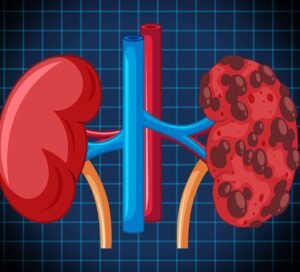Overview
Amyloidosis is a rare group of diseases characterized by the abnormal buildup of amyloid proteins in organs and tissues. This accumulation disrupts normal function and can lead to organ damage and failure. Amyloidosis can affect various parts of the body, including the heart, kidneys, liver, nerves, and digestive system.
What is Amyloidosis?
Amyloidosis occurs when misfolded amyloid proteins deposit extracellularly in tissues and organs, impairing their normal function. There are several types of amyloidosis, classified based on the type of amyloid protein involved and the affected organs. Common types include AL amyloidosis (primary), AA amyloidosis (secondary), and hereditary amyloidosis.
Symptoms
Symptoms vary depending on the organs involved but may include:
- Fatigue and weakness
- Swelling in legs and ankles (edema)
- Shortness of breath
- Numbness, tingling, or pain in the hands or feet (peripheral neuropathy)
- Unexplained weight loss
- Enlarged tongue (macroglossia)
- Irregular heartbeat or heart failure
- Difficulty swallowing or digestive problems
Causes
- AL Amyloidosis: Caused by abnormal plasma cells producing amyloid light chains (often associated with multiple myeloma)
- AA Amyloidosis: Linked to chronic inflammatory diseases such as rheumatoid arthritis or infections
- Hereditary Amyloidosis: Genetic mutations causing amyloid protein production
- Other types: Include dialysis-related amyloidosis and age-related amyloidosis
Risk Factors
- Chronic inflammatory or infectious diseases
- Family history of hereditary amyloidosis
- Plasma cell disorders like multiple myeloma
- Advanced age
- Long-term dialysis
Complications
- Organ failure (heart, kidneys, liver)
- Heart rhythm disturbances
- Peripheral neuropathy causing pain and weakness
- Gastrointestinal problems leading to malnutrition
- Increased risk of infections
Prevention
- Manage chronic inflammatory conditions effectively
- Genetic counseling if family history is present
- Early diagnosis and treatment of plasma cell disorders
Treatment Options in Korea
South Korea provides advanced diagnostic and treatment services for amyloidosis:
Diagnosis:
- Tissue biopsy with Congo red staining
- Blood and urine tests for amyloid proteins
- Imaging (echocardiogram, MRI) for organ involvement
- Genetic testing for hereditary forms
Medical Treatments:
- Chemotherapy targeting abnormal plasma cells (for AL amyloidosis)
- Treatment of underlying inflammatory diseases (for AA amyloidosis)
- Organ-specific treatments (e.g., diuretics for heart failure)
- Newer therapies including monoclonal antibodies and stem cell transplantation
Supportive Care:
- Management of symptoms such as pain, swelling, and fatigue
- Nutritional support and physical therapy













